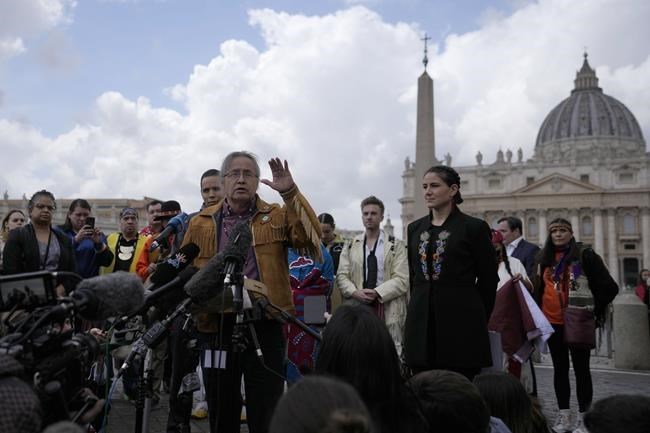Pope Francis apologized at the Vatican on Friday for the Roman Catholic Church's role in residential schools. The pontiff, speaking in Italian, asked for God's forgiveness for the deplorable conduct of members of the Catholic Church. "I want to say to you with all my heart: I am very sorry," Francis said during a final meeting with First Nations, Inuit and Métis delegates at the Vatican.
Here is some reaction from Canadians:
"I hoped for it. I prayed for it. I dreamt for it. But I never expected to live and see and feel it." — Chief Wilton Littlechild of Alberta's Ermineskin First Nation
---
"Behind the coverups, behind the indifference over a 100 years, behind the lies, behind the lack of justice, this Pope — Pope Francis — decided to go right through it and decided to speak words that First Nations, Inuit and Métis have been longing to hear for decades." — Natan Obed, President of Inuit Tapiriit Kanatami
---
“This moment, I think, reflects the determination and courage of many that kept up the fight over the years." — former national chief Phil Fontaine
---
"No words can erase the impact of the abuse endured by Inuit families … however, this apology is a significant step on the long road that leads to reconciliation." — Nunavut Premier P.J. Akeeagok
---
"The victims had to ask the church for the apology and travelled to the home of the wrongdoer to get it. It was the same with the Canadian government. I honour those who went. I am just sad they had to go. The best apology is changed behaviour." — Cindy Blackstock, executive director of the First Nations Child and Family Caring Society of sa���ʴ�ý
---
"It is long past time that the Church will begin to take responsibility for its role in the residential school system. It was a dark chapter of sa���ʴ�ý’s colonialist history, one which the Church was a key co-author." — Murray Sinclair, former chair of the Truth and Reconciliation Commission
---
“This is a historic moment: one filled with both sorrow and hope. More than 150,000 children were stolen from their homes and forced to attend residential schools between the 1880s and 1996: a number still raw to hear in the midst of this apology and the thousands of unmarked graves being discovered." — Acting Grand Chief Eric Redhead of the Assembly of Manitoba Chiefs
---
"I welcome the words 'I am very sorry' for my mother and all who did not live to see this day, especially our little ones who lay in unmarked graves across Turtle Island." — National Chief RoseAnne Archibald of the Assembly of First Nations
---
"Today's apology is a step forward in acknowledging the truth of our past in order to right historical wrongs, but there's still work to be done." — Prime Minister Justin Trudeau
---
"An apology is not only symbolic, it has real and concrete repercussions on how we move forward as a country. It is an important step towards accountability, reconciliation, and healing for families, survivors and communities who are living the impacts of discriminatory policies to this day." — Crown-Indigenous Relations Minister Marc Miller
---
This report by The Canadian Press was first published April 1, 2022.
The Canadian Press



